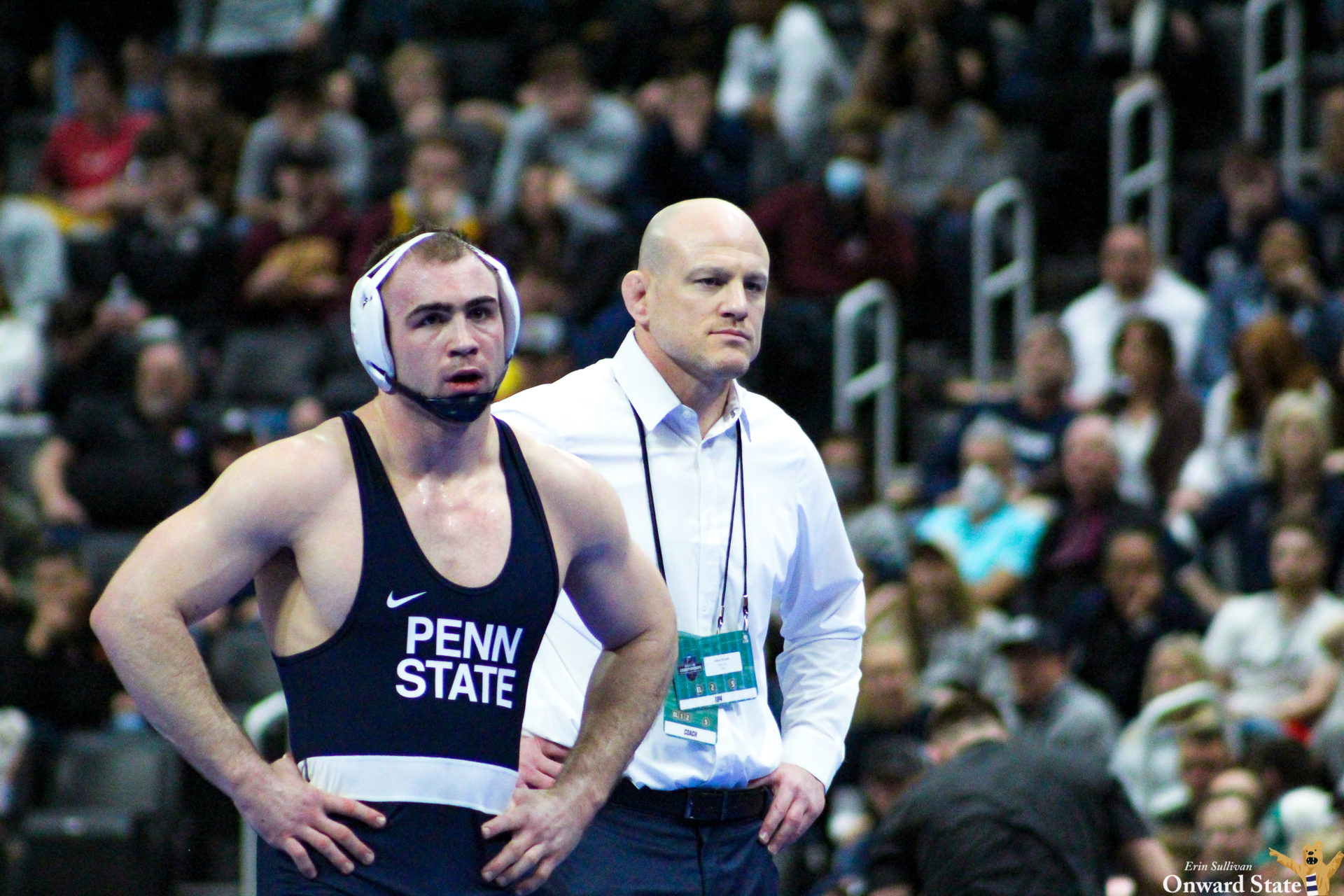
Time to Show Some Extra Gratitude for Penn State’s Cael Sanderson; How About a 10-Year Contract?

Cael Sanderson is approaching John Wooden territory. Truly legendary in the history of American intercollegiate athletics.
Wooden, the Wizard of Westwood, won 10 national NCAA basketball championships in a 12-season period at UCLA — with seven of them coming in a row.
On Saturday, Sanderson’s Penn State wrestling team won its ninth NCAA wrestling championship in the past last 11 NCAA tournaments — in 2011, 2012, 2013, 2014, 2016, 2017, 2018, 2019 and 2022 (2020 was cancelled due to the pandemic).
Five Nittany Lions made it to the finals – Roman Bravo-Young, Nick Lee, Carter Starocci (broken hand and all), Aaron Brooks and Max Dean. Five won national titles. In 2021, four Nittany Lions made to the finals. Four won national titles.
9 of 11. 9 for 9.
Time for a new 10-year contract, a nice parting gift for Sandy Barbour to leave if there ever was one. There’s precedent, right?
With Sanderson, it’s more than simply winning. It is how he and his athletes represent The Pennsylvania State University. I’ve seen it firsthand.
They often sit in the front row of class, and not just on the first day of the semester. They address their male teachers by “Mister” or “Professor.” They share their faith and they do good works. Like on Saturday night after the championships were over, when Brooks and his teammate Greg Kerkvliet were spotted a few blocks from Detroit’s Little Caesars Arena, sitting on a sidewalk with a homeless man, praying and giving him some money.
They are humble, like their coach.
Once, I asked a Penn State wrestler after class if he was “any good.”
“I don’t know,” he replied, with a straight face. “I mean, I’ve won a national title.”
Five summers ago, I embarked on a journalistic journey to talk with the most successful coaches on Penn State’s campus and ask them to explain their personal and coaching philosophy in a single word. I called the series, “One Word.”
Gratitude. That’s what Cael chose. No other coach’s story drew as many page views. Here’s how he explained his choice:
“There are a lot of words that are important. But I do think the foundation for success is based on gratitude,” he said then. “Everything — peace of mind, happiness, getting the most out of what you have — springs off of the word ‘gratitude.’ So, let’s go with gratitude.
“So, what does gratitude mean? I’ve thought a lot about it, for years and years. It just means that you think less about yourself. If I’m grateful, I’m going to think less about myself and more about others, and the opportunities I have.
“No. 1, the most important thing is just living it. Example is always the best teacher. You have to spend a lot of time introducing the concept, the idea, and what it means.”
Those are not just platitudes and coaching tools, or an aphorism that is placed in 3-foot high letters inside the wrestling room. Cael means it, lives it, teaches it, preaches it.
How do I know? Again, his wrestlers provide the answer.
Since that article, I ask every Penn State wrestler I meet one question: “What single word is most important to Cael?”
“Gratitude,” they always reply. Always.
• • •
Let’s be honest. Cael is not the greatest college wrestling coach of all time. Not yet. But his strong jaw is already prominently chiseled on the sport’s Mount Rushmore.
He is the best college wrestler of all-time.
He won four individual national titles at Iowa State, going an incredible 159 and 0 (winning his first natty at the Bryce Jordan Center, in 1999). Sports Illustrated called his career the No. 2 performance in American college sports history. No. 1 occurred in 1935, when Ohio State’s Jesse Owens set four world records in one hour during the Big Ten Conference track and field championships.
Jesse Owens, Cael Sanderson, same sentence.
John Wooden, Cael Sanderson, same sentence — as a coach and as an athlete. As a student, Wooden was a 5-foot-10 guard at Purdue. He was the first basketball player named All-American. Ever.
Sanderson still has a bit to go to have the most national titles, both at Penn State and in all of college wrestling.
At Penn State, legendary fencing coach Emmanuel Kaidanov won 12 national titles, including six straight from 1995-2000.
At Penn State, the late and great men’s gymnastics coach and showman Gene Whetstone won nine national championships.
At Penn State, smart and sassy women’s volleyball coach Russ Rose – Sanderson’s former next-door neighbor in a dingy second-floor corner of Rec Hall, Rooms 236 and 237 – won seven national titles, including six in eight seasons (2007-2010; 2013-2014).
At Penn State, the late, great and gracious Gillian Rattray won five national championships – three in women’s lacrosse and two in field hockey.
At Penn State, the legendary Joe Paterno won two national titles in five seasons and 409 games overall.
Speaking of victories: Sanderson was 127-3 as a high school wrestler in Utah, 159-0 in college at Iowa State, 44-10 in dual meets in three seasons as the head coach at Iowa State, and 158-12-2 in dual meets at Penn State. In total, that’s a record of 448-26-2 — a winning percentage of .949511456.
Oh, yeah – he also won a gold medal at the 2004 Olympics.
• • •
In the annals of college wrestling, Sanderson is still chasing the streaks of late Ed Gallagher of Oklahoma State and the near-mythical Dan Gable of Iowa. (An Iowa State grad, just like Cael, Gable was 117-1 in college, with two national titles and a runner-up finish.)
Gallagher’s Oklahoma State teams won 11 NCAA wrestling titles in 13 years, from 1928 to 1940. Gable’s Hawkeyes won nine consecutive titles, from 1978 to 1986. Overall, Gallagher won 11 titles and Gable 15.
Overall, Oklahoma State won 13 titles in 15 seasons (1928-1946, allowing for three years without the tourney, due to World War II) and Iowa won 11 in 12 seasons (1975-86). Cael’s nine in 11 is in that historic neighborhood.
• • •
Of course, Cael doesn’t do it all himself.
On GoPSUSports.com, there is a Penn State team photo, taken on the center mat in Detroit, minutes after the Nittany Lions won the national championship on Saturday night. It includes assistant coaches Casey Cunningham, Cody Sanderson and Jimmy Kennedy, as well as director of operations Adam Lynch. To the far right are Rick Kaluza, the senior associate athletic director who oversees wresting, and Bonnie Epstein, the team psychologist. It is as good of a group there is on campus.
Not in that picture literally, but in the wrestling picture since Cael’s Day One at PSU have been supporters like Ira Lubert and Galen Dreibelbis, who have been grateful for his presence since the day Tim Curley hired Sanderson, on April 17, 2009 – 4,720 days ago. (Bravo-Young was just 10 years old.) Then there are the thousands and thousands of diehard Penn State wrestling fans who pack Rec Hall and, on occasion, the BJC.
But, in the end, it is Cael Norman Sanderson, the son of a high school wrestling coach, the husband to Kelly, the dad to Tate and Teag, who makes Penn State wrestling what it is.
I recall that it took me weeks and several conversations, long and short, all over Rec Hall and campus, to convince Cael to do the “One Word” series. It was the toughest interview to get and perhaps the one in which I learned the most. Not just in the Q&A, but in the quest to make it happen.
He was torn. I had to earn his trust.
“What if I give away my secrets and all the other programs read about it?” he said one day. Another time he wondered, “What if what I have to say isn’t worth anything?”
His doubts surprised me. But, they weren’t really doubts, as it turned out. He was sizing up the opposition. Me. In the end, though, he did it. For which I am grateful.
The day of the interview back in that summer of 2017, we sat in his office and what he had to say mattered. Indeed. And in deed. Three times below he mentions that he wants to win, as if there was any doubt. But gratitude…it is also always there.
“Gratitude is remembering that, ‘I do want the pressure. I do want the opportunity to compete for a national championship. I’m grateful that I have this pressure right now because if there is pressure it means I am not quite there yet.’
“Winning is what you really want to do. Gratitude helps you remember why you got into this to begin with. It’s not about being cool or winning for any other reason — like picking up Twitter followers or anything like that. Who cares about that? If you’re caring about those things, they will steer you away from your true goal.
“We need to get the right kind of kids who have a similar mentality. We’re not going to take a kid and change him. We can guide him a little bit. With great kids, you think of their parents and the people around them.
“We want to win. And my job at Penn State is to win. If I want to keep my job, we have to have success. But there are more important things. And doing things the right way — being honest, being consistent when things are both good and bad, where you stand — are more important. I get it. Everyone is going to say those things. It’s just a matter of do you actually do them?
“We want to win. Every day is a sprint. It’s harder to stay on top than it is to get to the top. That’s just the way it is. It’s July and we haven’t slowed down a bit since the nationals. And we’re not going to slow down. That’s what we ask our kids to do, right?”
 Menu
Menu









 Instagram
Instagram  Youtube
Youtube